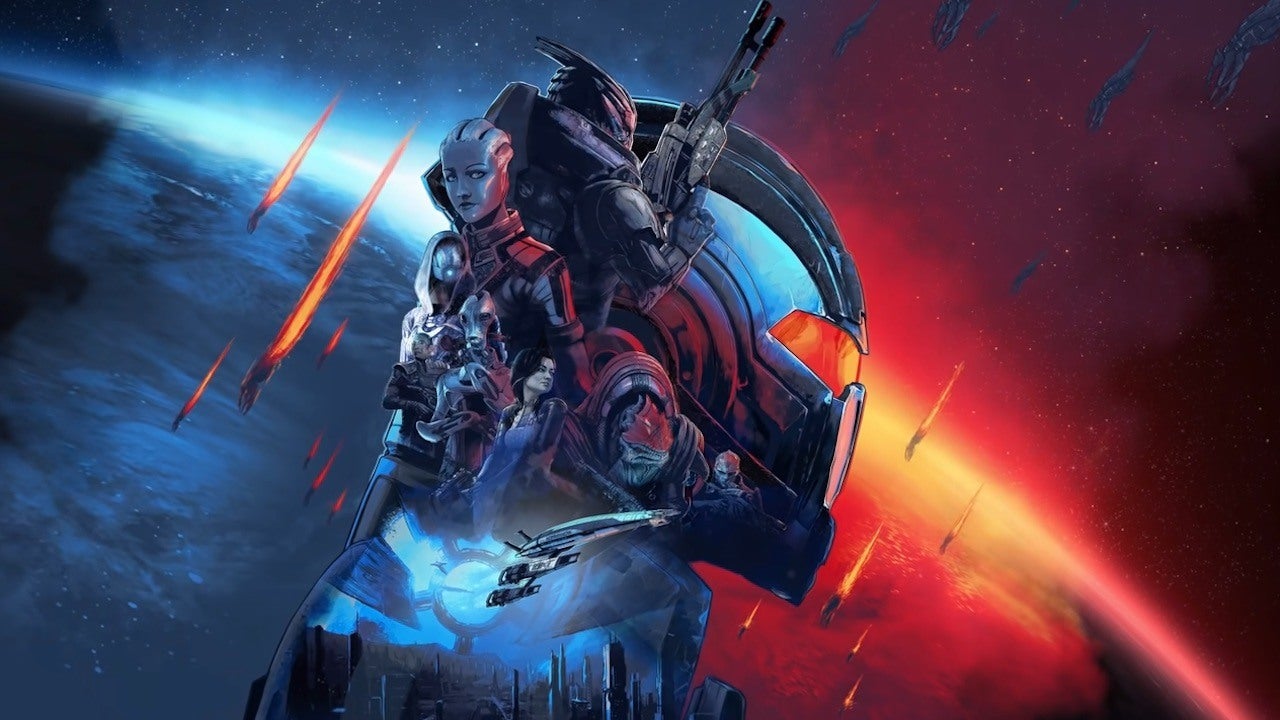I’ve now completed Mass Effect 2 for either the seventh or the eighth time, and I have some thoughts on the matter.
First, the occasion: we’re going through all three of the original Mass Effect games in their remastered form, the Legendary Edition that BioWare released in May as some sort of victory lap slash mea culpa slash distraction from the complete tire fire that the studio’s original work has been for the past five or six years. Previously we covered Mass Effect, which felt like a transition into a genre that never was — RPG shooters would survive and thrive in the 2010s, but they’d look a lot more like Bioshock than they would Mass Effect. The biggest third-person shooter/RPG hybrid with active cooldown powers other than the Mass Effect series in this time period is probably Alpha Protocol. I love Alpha Protocol. I’ve written about it before on this site. It does not reach the heights of Mass Effect 2, and it spawned no progeny for reasons beyond the infamous debacle over its Metacritic score and Sega’s lack of vision as a publisher. Mass Effect 2 remains the king of whatever these sorts of games are.
The game starts with possibly the best sequel pitch in modern video games: You, Commander Shepard of the Normandy, have been ambushed and killed by an unknown foe, dying to save your crew (and if appropriate, your loved one from the first game). Resurrected by your enemies, you are asked to put your differences with them aside and lead a suicide mission into the heart of the galaxy to save humanity. You can’t do it alone. You have to put together a team.
The accoutrements certainly help; all of the living characters from Mass Effect return in some fashion, some as party members and some as very important plot NPCs. Seth Green is once again excellent as Jeff “Joker” Moreau, the Normandy’s pilot. The casting of Martin Sheen as the leader of the referenced previous enemies, the Illusive Man of the human supremacist organization Cerberus, is nothing short of brilliant. In 2010 he was only a few years removed from the jewel of the second act of his long career in television and film, the role of President Jed Bartlet on Aaron Sorkin’s The West Wing. Bartlet is a reasonable-seeming, incredibly charismatic leader of men. He is also a fanatic who, in the rare instances where he is unable to talk someone into something, simply deploys all of the power available to him upon them like an earthly agent of God. In West Wing, this fanaticism is for the American project as interpreted by Reaganite and Clintonian professional-class liberalism. In Mass Effect 2, it is for the zero-sum, total and complete advancement of the aims of humanity, done as elegantly as possible or as brutally as necessary. In practice and in Sheen’s performance, there is very little daylight between the two.
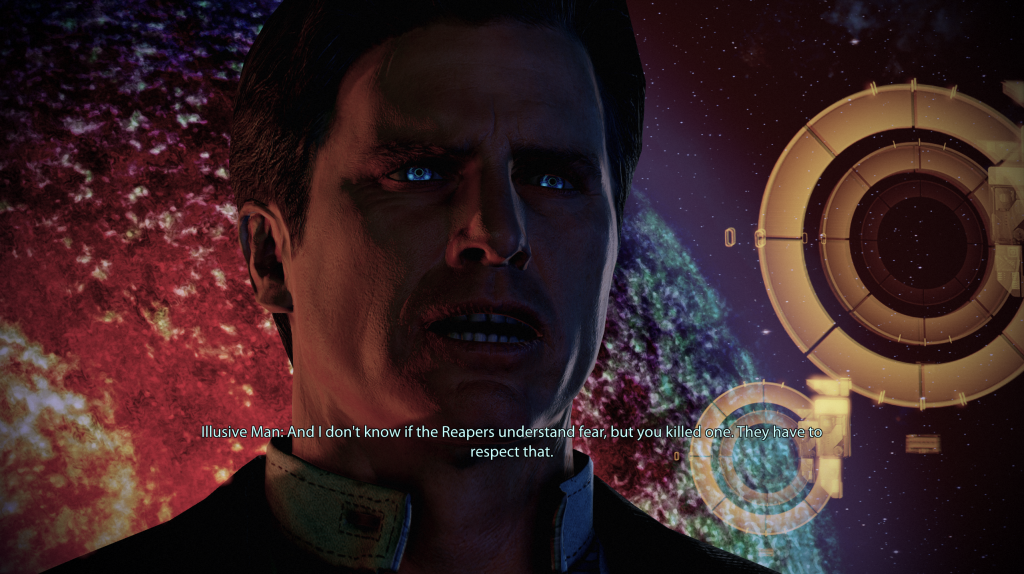
The simple act of building the team, though, is what the game revolves around, and what makes it the purest expression of what BioWare has shot for in all of these titles. It is character-focused to a fault — the characters are the narrative. How you interact with these people (indeed, whether you interact with these people; you don’t have to recruit all of them or even any of them to technically complete the game) determines how the plot resolves itself. Do you listen to them? Do you value them? This will have deterministic effects on how your suicide mission resolves, and this makes narrative sense: the reason you do everyone’s loyalty missions isn’t to fill a quest log or tie up loose ends or see content, but because their loyalty and buy-in will matter when push comes to shove.
That’s for the end of the game, though. In the beginning, the first thing the player will notice is how much better everything about playing Mass Effect 2 feels compared to its predecessor. Aiming is snappier, ammunition for weapons is handled with a standard clip/reloading system instead of the overheating concept from Mass Effect, cooldowns have been simplified to a shorter global cooldown on all activated abilities instead of longer cooldowns on each skill, and the wonky physics system has been scaled back to turn powers into reliable, predictable applications of damage and debuffs rather than sandbox-y interaction machines. The game definitely tilts more towards the shooter end of things than Mass Effect did, but that’s to its benefit: it emphasizes skill and tactics-based gameplay that rewards knowing what powers hard counter what defenses or enemy types, rather than strategic exploit-based gameplay based on using Adepts to trivialize entire encounters with power interactions. (It helps that Adept is still probably the most powerful class in the game, though Vanguard is close, and for some players much more fun.) Part of this was just a dedication to streamlining a pretty clunky combat system from the first go-round, but part of it was business: Consoles were on the rise in the market and the conventional wisdom was that PC gaming was waning. BioWare wanted a playstyle that better fit a controller, and they got what they set out to achieve.
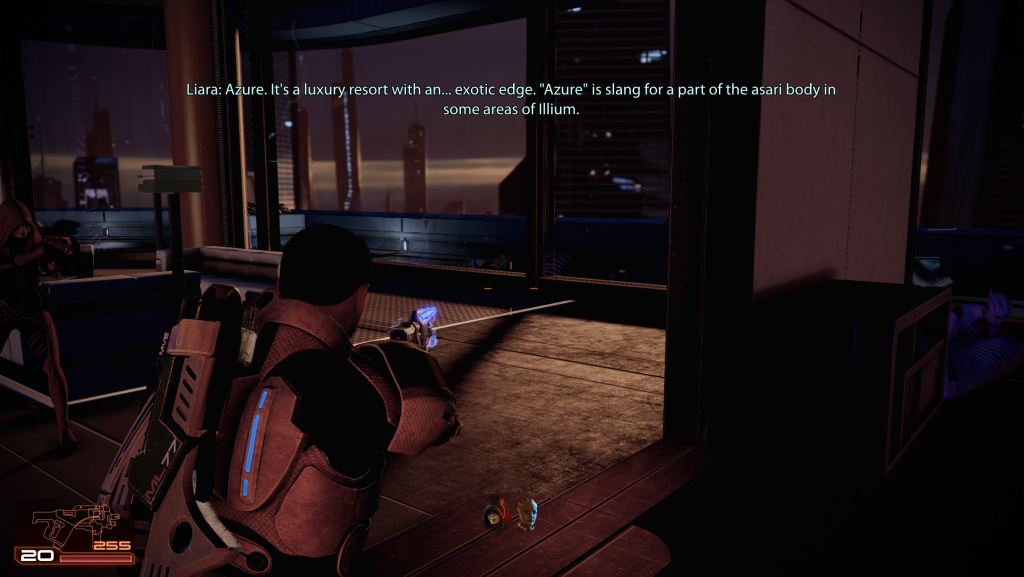
There is, in fact, a lot of this game that’s informed by its age. There aren’t any more close-ups of Miranda’s ass, perhaps, but most of the stuff that’ll make you blink a little bit can’t be fixed by changing a camera angle. There’s the fact that the developers attempted to balance her out with the male counterpart Jacob, who also has a finely toned ass, also wears a painted-on jumpsuit, and also has extreme problems with his father. Whereas Miranda’s story leaves the disconnect between the rather tame stated designs Miranda’s father has for her and her younger sister and the violence which with Miranda reacts to the idea of either of them returning to him up to the reader to untangle, Jacob’s loyalty mission lets it all hang out there: Ronald Taylor is an absent father who, after his starship crashed on a world with psychotropic drugs, went around getting every woman on his crew doped up on space weed so he could put them in his harem. There’s a particularly odd juxtaposition if you’re playing as female Shepard trying to romance Jacob, because over in his dialogue tree, she’s turning every work conversation into a comment on how hot his body is, or leering “the Alliance lost a fine soldier, Jacob.” Do you get it? You expected the male superior officer to harass the female subordinate, but instead it’s the other way around. Is your mind blown? At least the voice work is top notch.
There’s the entire Jack character, of course; the badass biotic bitch who will have casual sex with Shepard but will have to be taught that’s unhealthy by a firmly abstaining Shepard before they can get into a meaningful, long-term relationship. Male Shepard only, though, as Jack is the crowning achievement in BioWare’s still-ongoing tradition of making all of their queercoded female characters straight — it’s pretty well established fact now that BioWare management changed direction on Jack at the last minute after making up a Fox News segment in their heads to scare themselves with. That they thought it would be okay if they just gave you another asari woman to sleep with, when the Fox segment that prompted this panic attack specifically went after the Liara/Shepard female romance from Mass Effect, is the epitome of how all these companies who would be changing over to rainbow logos for June less than a decade later handled their business back before Pride was used to sell hamburgers.
There’s David in the Overlord DLC, an incredibly insulting caricature of an autistic man who sits about monotoning square root calculations and acting as his brother’s lab recorder, whose neurodivergent condition is presented as giving him not a figurative but a literal computer brain that can interface and share data with the evil Geth mass consciousness. Most directly his autism manifests by giving him the apparent mental age of a nine or ten year old, and turning the denouement of the DLC story package into a custody battle while he remains strapped to some Hellraiser device. It’s easy to see where things went wrong: the writers were chasing a storyline that was able to pack the most emotional impact possible into three or four hours of content, and that meant shorthand, shortcuts, and emotional dirty pool. And they were almost certainly told that no, they couldn’t use an actual child. So this is what they went with instead, and they’d probably do it differently now.
It’s a genuine relief, then, how much better the writers did on the subject of genocide.
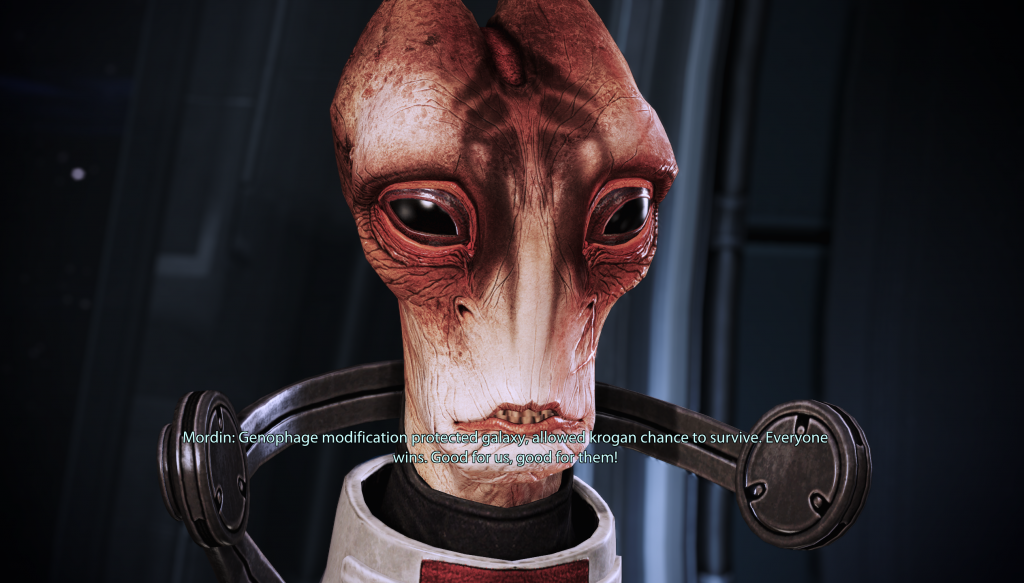
Two years after the release of this game, Mass Effect 3 tried to pay off two massive, trilogy-long plotlines building directly off of two of the best character moments of this game, and while the enterprise as a whole more or less fell on its face, the cure for the genophage and the quarian return remain the most beloved parts of the flawed project. This is because the characters involved in them were beloved, and they were beloved because both previous games did the hard work of providing players with meaningful if simple and binary choices that paid off, setting the stage for the next game to build further. Though wild fan favorites now, when we meet them in Mass Effect 2, Mordin Solus and the quarians of the Migrant Fleet are still very much on trial in the court of narrative morality (and in Tali’s case, literally on trial) for their vast, civilization-scale crimes against the krogan and the geth. While Tali, Legion, and the quarian fleet are great, it’s worth putting them to the side to look closely at the best-written, best-conceived single mission in all of Mass Effect: the loyalty mission for Dr. Mordin Solus.
Mordin is a fantastic character. Players immediately fell in love with him, and it’s easy to see why. He’s the complete package: the quirky, confident, motor-mouthed super-genius who doesn’t take shit from anyone, is thoughtful, warm, and funny in private conversation, and is always able to pull some piece of sci-fi tech nonsense out of nowhere to save the crew’s bacon. The salarians were the last of the big five alien races to get their team member slash mascot, and Mordin is right there with Wrex, Garrus, Tali, and Liara.
Mordin Solus is also, without hyperbole or deception, the greatest monster of the last 50,000 years of galactic civilization. And that might comfortably include Sovereign.
First, a primer on the genophage: A sterility plague that works by forcing miscarriages in all but 1 in 1,000 live krogan births. Mass Effect is a bit vague on this but Mass Effect 2 clears it up decisively and intentionally: the genophage does not work by preventing conception. It works by making all but .01% of krogan fetuses develop into a newborn that is clinically braindead and cannot survive outside of the womb. It is an atrocity. Mordin Solus didn’t make the genophage, however; he was simply assigned to study it with a group of junior researchers and make sure it was still working.
It wasn’t. Krogan biology was adapting. Slowly, krogan women were beginning to deliver more and more healthy children. So Mordin took it upon himself to…fix the genophage. He made the executive decision to go beyond study and update that atrocity’s particular Github, then reapply the genophage to the entire krogan species — and, because such a judgment is inextricably bound up in making such a decision, he reaffirmed his belief that it was the moral and just thing to do. The original authors of the genophage were war criminals beyond measure, yes, but all they had to go on were simulations and mathematical models. Mordin saw the way the genophage broke krogan society, studied it closely, and concluded that not only was it worth it — it was optimal. He compares the genophage approvingly to gardening.
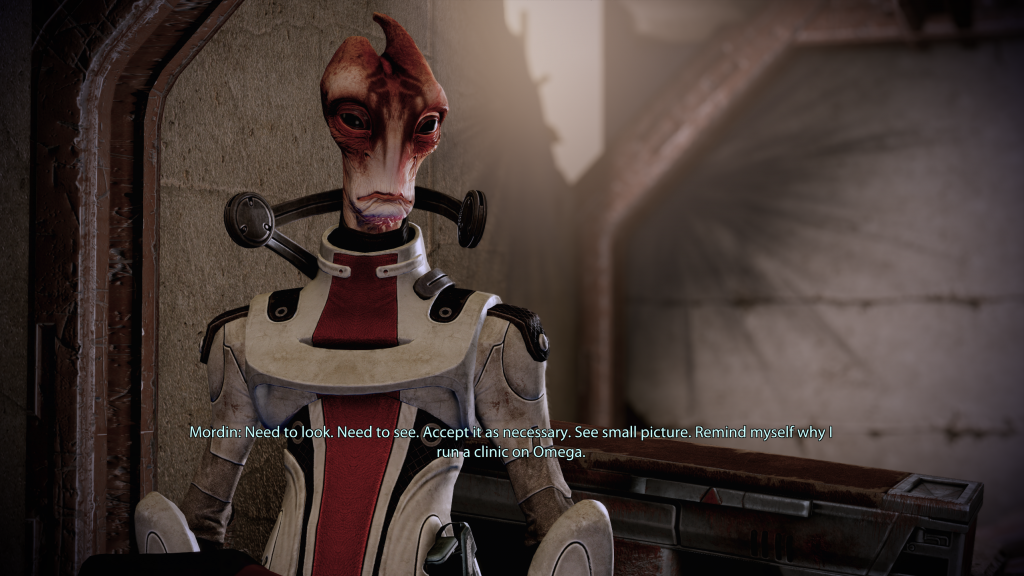
Mordin tells you all of this and more during a whirlwind interrogation in the morgue of the lab where Clan Weyrloc attempts to backsolve a genophage cure; a lab Mordin furiously condemns in the harshest terms as monstrous, deviant science whose barbarous methods could bear only poisoned fruit. Not satisfied with just the standard salarian/turian party line about krogan birth rates leading to a savage tide overwhelming the galaxy, Mordin pulls out all the stops: that his whole team unanimously agreed the genophage had to be restored, as if they were a democratic legislature instead of a military unit he commanded; that the salarian ‘wheel of life’ religious doctrine (Much like your people’s Hinduism, Shepard!) tells him that all those dead krogan babies were simply borne into their next lives; that all Shepard needs to do is run the data — the impartial algorithms he and his team programmed themselves were quite clear that the krogan were too savage and violent to sustain peaceful civilization. The numbers can’t be racist, Shepard! In a particularly sublime and grotesque moment he turns pro-choice rhetoric against the player, reasoning that fetuses are not babies and because his genophage stopped all neurological development, these stillborn deliveries are just the expulsions of undifferentiated natal tissue, no matter how emotional the mothers understandably are. At every step he assures you that not just every argument against the genophage but the suffering of the krogan that you so piously wield has been heard and seen by him, and that when he decimated their decimation to the tenth generation, he did it because he cared.
At the height of his gall, he turns to stand over the corpse of a krogan mother who died in the experiments at the lab so he can pray for her soul. Out loud, of course; his only audience is Shepard.
I wanted to compromise Mordin to a permanent end after this scene back when I played the game the first time in 2010; it was far from the first time I’d had that reaction to a party member in an RPG, but it was definitely the first time I wanted to do it not because they annoyed me but because I felt it was clearly the right thing to do. Much of the time “renegade” dialogue options on prompts related to the genophage across the series lead to responses where Shepard vocally supports the aims and necessity of the crime, if not the method. Once you’re in this conversation tree in the morgue, however, the renegade option becomes the righteous one, rejecting Mordin’s sophistry out of hand to attack the fundamental crime; as the paragon tries to understand Mordin better, the renegade lays bare all you really need to know with one question: “You were willing to commit genocide over the outcome of a few simulations?” to which Mordin indignantly and immediately snaps back, “Yes!”
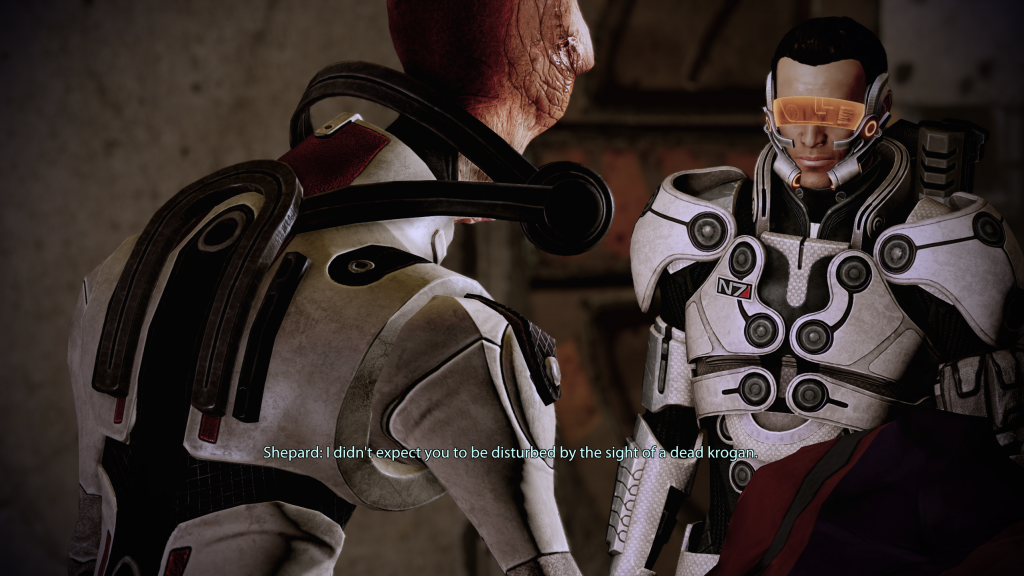
The loyalty mission wraps up quickly after that, culminating in an apoplectic Mordin leveling a gun at his former protege, beside himself to discover Maelon voluntarily assisting the krogan in trying to reverse the genophage. Mordin’s demand for an explanation morphs immediately into a speedrun recapitulation of his defense of the genophage, and rather than indulge him Maelon dismisses the entire premise of the thing out of hand. The protege’s argument is simple: he is an unforgivable monster, and he was made into an unforgivable monster by another unforgivable monster, and the main difference between the two of them is that one of them admits this and the other one is sputtering about how clear the simulations were.
This section isn’t perfect; Maelon draws his gun first in a panic in order to give Shepard and Mordin the justification to get their own weapons out and debate his execution. Shepard gets some questions that should be Mordin’s to ask, but Mordin doesn’t have a dialogue wheel. Rushing the man with the gun and punching him with your fist as Mordin does to disarm Maelon is not only hokey, it doesn’t look very good. It doesn’t really matter by that point, though. As Mordin stands at the terminal after shooting or banishing Maelon, bemoaning his real mistake — insufficiently attending to the ideological commitment of his lab assistants — the point has already been made. And despite any protestations paragon Shepard may have had back in that morgue, by the end he was instrumental in making it.
That’s important, and it’s the last thing to learn here: The reason paragon Shepard has a tougher time rhetorically with Mordin in the morgue than the Shepard who chooses the renegade options is that they’re very similar. Both have substituted a complicated network of excuses, convenient hypotheticals, and arguments from outcome (“Well it worked, didn’t it?”) for a strong moral code in order to rationalize the bad shit they’ve convinced themselves they have to do, and both have dealt with the contradictions that have resulted by doubling down on that code over and over again. There are multiple times in Mass Effect 2 where paragon Shepard will make a demand or render a moral judgment, have it compared to their past or current behavior, and respond by blustering that in effect it’s different when they do it — trust them. In fact, this is the backbone of basically every interaction paragon Shepard will have regarding Cerberus with people not in that group. In the end, it’s an appeal to competence not morality that gets paragon Shepard out of the conversation in the morgue with the last word — look at the woman on the table, Mordin. If you’re so right, how come she’s so dead?
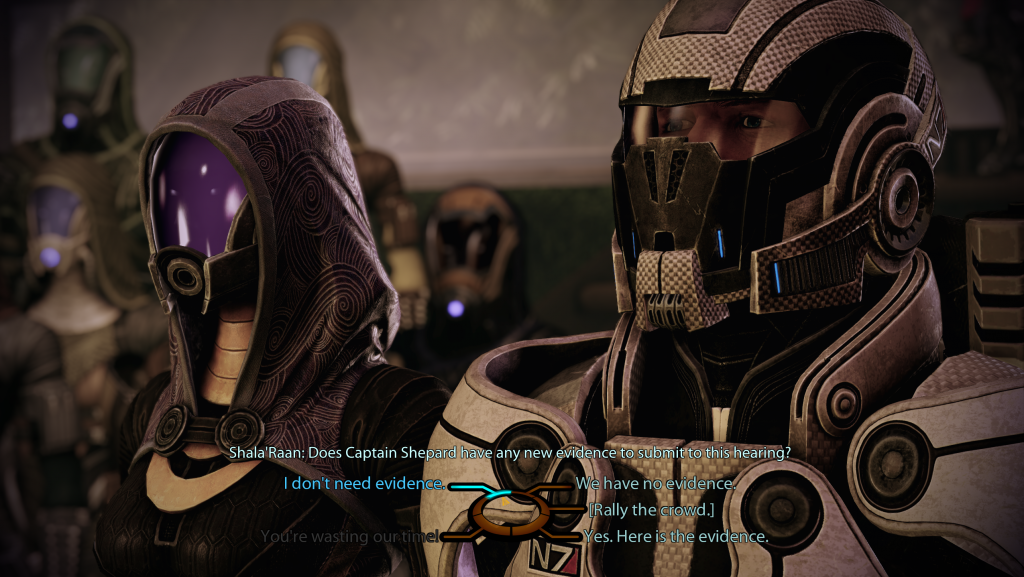
In this way, the paragon choices, scripting, and narrative design in Mass Effect 2 have aged far better than the renegade options. Renegade Shepard is and always has been a hedonistic, id-driven dick whose behavior never worked in any framework more complicated than “felt like doing it at the time.” Selecting a renegade option in all three games can feel more than a little bit like opening a mystery box and trying to guess what kind of Shepard personality you’ve pulled this time: Puckish? Psychopathic? Nihilistic? Defiant? It’s nowhere near as bad as, say, Fallout 4, but renegade Shepard mostly does whatever seems cool or feels good (or sometimes merely cathartic) to do in a given scene, and the player is just there for the show. Paragon Shepard’s decisions might be no less logically arbitrary (you’re only ever getting slight variations on already-decided scenes) but paragon Shepard thinks they’re a hero, and more importantly, needs everyone else to think they’re a hero too. Generally speaking, they’re right: the good they’ve done does outweigh the moral shortcuts and unfortunate mass shootings undertaken as a matter of gameplay. But paragon Shepard is someone who frequently asks their conscience for absolution, not for guidance, and all it takes is one bad day and–
Well shit. There go three hundred thousand batarians.
All the way on the other end of the spectrum from Mordin’s loyalty mission sits the Arrival DLC. It can be played after completing the suicide mission and creating a clear game save file, which is good because it came out a year and change after the base game and is meant to be the direct lead-in to Mass Effect 3. I didn’t play it this time around. As far as I’m concerned it’s part of the third game — it’s certainly made with that title’s driving ethos — and when it comes to consequences for your Shepard heading into the trilogy’s finale, the only way to win with Arrival is not to play. The actual game experience is baffling; while it’s understandably difficult to get some twelve voice actors back in the studio to record companion dialogue, that doesn’t mean the solution is a stealth section followed by an entire solo level for Shepard, constrained by a countdown timer. The game wasn’t balanced for this. Victories feel tedious, deaths feel cheap, and handing out special weapon ammo like candy is a poor fix.
What use is there examining the motivation of the villains? They’re all indoctrinated. There’s only so many times Reaper mind control can be spooky before you start realizing just how much Calvinball it all is, and this isn’t really one of the better showings. If you guessed the doctor working on the ancient relics was the real villain of the DLC, congratulations. Your reward is that by the end of the story content, you will have killed an entire batarian colony…but not really, as events are contrived to leave you in a position where, based on whether it’s convenient to your Shepard, you can honestly protest innocence or gleefully take credit for a mass relay explosion annihilating a star system full of people. Just to make sure you know you made the hard choice (again, there is no actual choice) and did the right thing, Harbinger himself will hop on the conference call to monologue at you about the threat being real and this setback being meaningless and so on. This is a preview of the “choices” that will define Mass Effect 3: the decisions you make will only really affect your Shepard’s self-conception and posturing. The mass effect relay is gonna blow up either way. Case in point: if you skip Arrival entirely, you find out in the next game that a group of redshirt Marines went instead and did that content for you offscreen, with the same exact result. You lose a little bit of war score in exchange for not being reminded constantly that the Arrival DLC happened. I’ll take it.
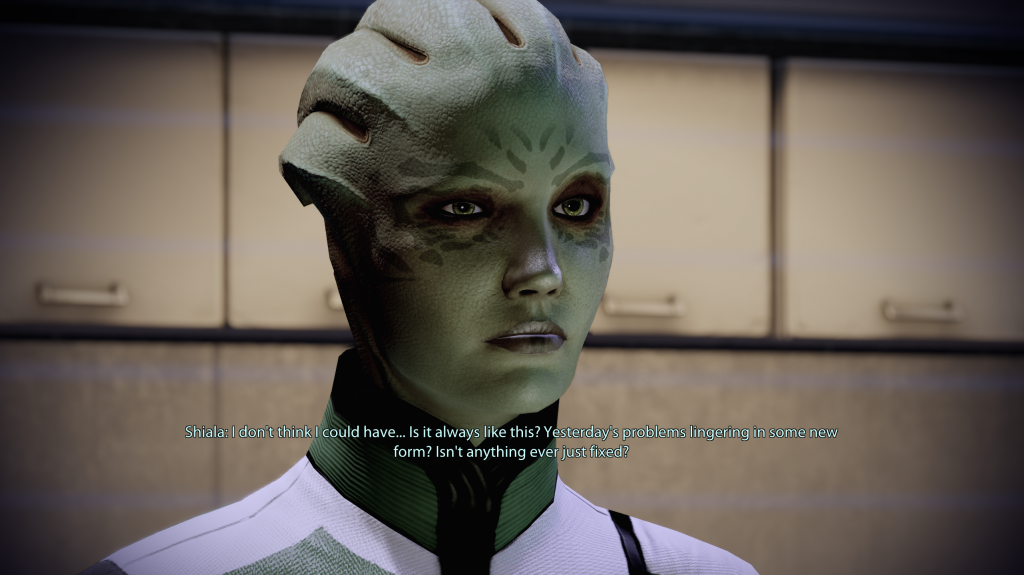
But wait — how is that different from Mordin’s loyalty mission? Or any loyalty mission, even Jacob’s whole creepy deal? After all, these missions all play out basically the same way until the climax, and in some of them you get the character’s loyalty just by exhausting the dialogue tree, no matter what you choose. The answer is simple: it’s time to discuss the suicide mission.
The two and a half hours or so of the game that take place between the initially confusing and then upsetting cutscene that intrudes a bit after you get the Reaper IFF and the credits roll are for my money the best payoff any game of this type — BioWare CRPG, shooter RPG, whatever; you can throw the restored content KOTOR II and Fallout: New Vegas and even Prey (2017) endings up against it and none of them touch the gas Mass Effect 2 is cooking with. Mass Effect 2’s ending argues three key things. First, and most obviously, the least important part of a choice is the decision, and the most important part of a choice is the consequence. When the suicide mission wants you to make important in-mission choices, it abandons the dialogue tree and paragon and renegade options and all the trappings and just gives you a screen with three to seven options. And don’t think this means the menu doesn’t care what you pick, so long as you pick something; the menu cares deeply what you pick. It just doesn’t care why you picked it. The consequence is coming no matter how you justify it, paragon or renegade, and it’s coming fast.
Second, a choice is part of a narrative arc that starts with a decision and ends with a consequence. You have to treat them like the rest of your narrative; you can’t split them up. Chekov did not say to introduce the gun to the mantle in the middle of the second act and then fire it at the end of your next play. This is why the decision to complete or ignore Mordin’s loyalty mission is a choice, and the decision to shoot Maelon or save the genophage data is not. The consequence of Mordin’s loyalty will be shown to you in real time throughout the suicide mission. The decision to save the genophage data, on the other hand, has no consequence in Mass Effect 2 — but no narrative consequence in Mass Effect 3 either.
Small aside: actual choice and consequence aren’t to be confused with the mere scripted content; if you saved Maelon’s data in Mass Effect 2, you absolutely will see a much different sequence of content on Tuchanka than you would if you destroyed it. But what are the narrative choices about in Mass Effect 3? They’re not about curing the genophage. They’re about building the fleet, which is introduced at the beginning of Mass Effect 3 and then paid off, allegedly, at the end. Properly speaking, you’re not deciding whether or not to cure the genophage; you’re deciding what degree of support you want from the salarians as opposed to the krogan. You can successfully make the War Score number increase in this system of choices with or without the genophage data. You can successfully make the War Score number increase in this system of choices with or without Mordin! This is why despite there being so much great, moving scripted and acted work for what is screaming to be the most important moment of the entire trilogy, and with so much variety based on previous decisions you’ve made, it feels absolutely weightless by the time you actually roll into the endgame. It barely seems like it happened. What was introduced in the first twenty minutes of Mass Effect 3? It wasn’t the existential struggle of the heroic people of Tuchanka.
Third, a decision has to fit the scope of the consequence, and vice versa. The Mass Effect series is predicated on creating an idealized player avatar that mediates your protagonism as you move them around like a doll, watching the avatar form relationships with fully-realized fictional characters, relationships that you help define, and in doing so, invest a substantial amount of your own imagination, invention, and emotion. That’s the secret sauce. You pilot Shepard around like an Eva designed for fucking and punching, meeting a bunch of compellingly and completely sketched but thinly realized characters. In this game, Jack is two story missions, some dialogue trees filmed at weird camera angles, and one and a half awkward sex scenes. All that other shit exists in your head. When it’s done right, you don’t need a lot of content to go a long way (though Mass Effect 2 certainly has a lot of content), because the player will see your “long way” and just strike out towards orbit. It’s why there’s so much porn of literally all these characters. The moment the player runs out of conversations to have with Tali and first thinks to themselves “Huh, I wonder what she’d think about ______” — that is the game. Everything else is getting to that point.
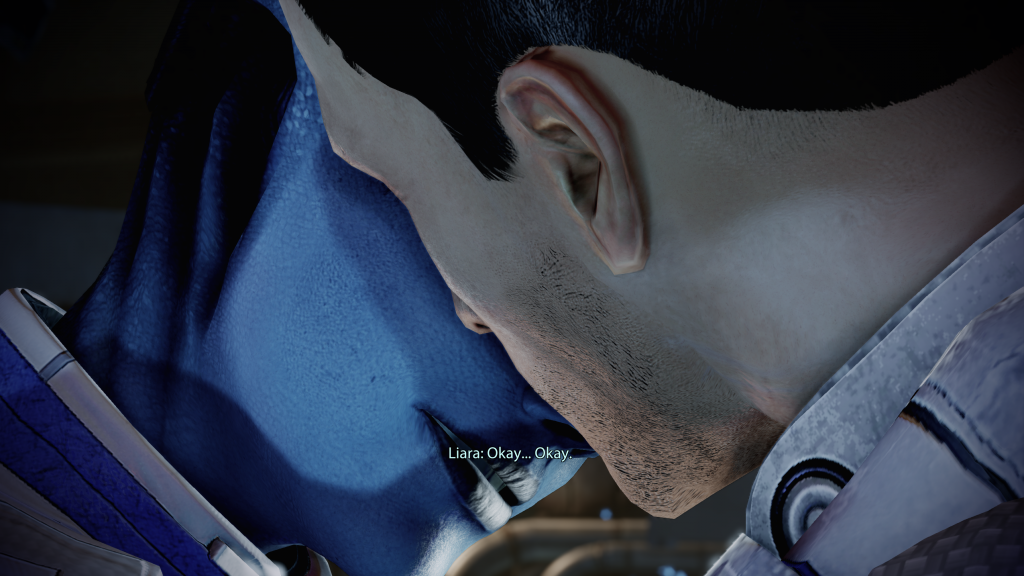
So the scope of choices in Mass Effect 2 is, therefore, Shepard and the team. It’s not the genophage. None of you got angry at or defensive of or horny for curing the genophage. That’s just a tool they used to get you angry at or defensive of or, god help you, horny for Urdnot Wrex and then Mordin Solus. Same with the disposition of the Migrant Fleet towards war or peace (except less impressively, because that stuff is just not executed as well as Mordin and the genophage). Same with whether the Alliance fleet got destroyed at the end of the first game!
Okay but what if they fucking killed Garrus? Even after you saved his life on Omega, then saved his soul on the Citadel, and confessed your feelings for him? What if he just fucking died?
This is why everyone looks up the right decisions for who goes in the pipes and who leads the fireteam even though they already know they know it. This is why after being upsettingly blindsided by it on their first playthrough getting a consequence they don’t like, everyone knows from the start of the game what they have to do to save the crew. This is why absolutely no one cares about all that nonsense with the “human Reaper,” the huge reveal the game’s plot has been building up to for some forty to sixty hours, depending on your DLC. The only choice involving the human Reaper is what flavor of reasonably condescending President Bartlet is. Between this game and the next one, they quietly tossed all that stuff about sacrificing entire species to immanentize their death god and add it to the Reaper pantheon and pivoted to figuring out what the other council races’s husks looked like. Statistically speaking, no one was disappointed by this. Certainly no one got cupcake-level mad.
But if Garrus fucking died, what did you do? Did you say “well, those are the breaks, I’ll import this into Mass Effect 3?” Because you could. There’s content for that. Not much, and few people have seen it anywhere but Youtube, but it’s there. It’s a rhetorical question though because you’ve already figured out what you did wrong from the internet and are trying to locate the most recent save you have where you still have a chance to fix the timeline by doing something differently. And that’s how you put choice in a video game.
The graphics are also cool.
After reading the above, you might be asking yourself, “hey, all this rather obvious stuff about how choices only really work in the context of the narrative in which they’re made, rather than the context of the fictional world at large — doesn’t that imply some pretty bad things about the game whose whole pitch is giving every decision still hanging around in the franchise a final consequence?”
Next time, we do more than imply some pretty bad things about Mass Effect 3.
Final Verdict:
I don’t write 5,000 words about games I don’t think you should play. Mass Effect Legendary Edition Collection is $60 on Origin for PC and XBox/Playstation for console, both generations. If you’re on the fence about which platform, the XBox version will let you install the games individually while PC and Playstation require the whole deal.
Have any questions or feedback? Drop us a note in the comments below or email us at contact@goonhammer.com.
